|
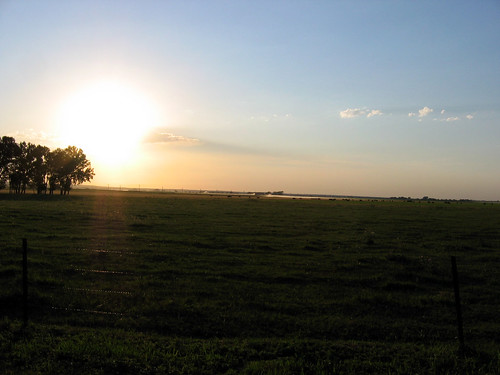
A quiet morning, Ogallala, Nebraska.
(*photo credit)
October 1, 2013 Reflection Involves Silent Space and Time
Stillness is what creates love. Movement is what creates life. To be still, yet still moving -- that is everything!
Do Hyun Choe, Japanese sage
In this month of October we will focus several times on Chapter Seven of Reclaiming the Commons. Today's reflection is from the introduction of the October chapter where we state that our deeds demand careful reflection, especially since we live in a world of ever-more-intrusive noise. We need silent space and time.
---------------------------
The value of silent space/time rests with the interplay of harmonious sounds and silent pauses, and both are necessary. The legal expression "You have the right to remain silent" is part of a broader right to silent space. Furthermore, we do not have the abusive privilege to make noise that disturbs another's silent space and time, even though some "noise" is regarded as music to a few. Here competing rights and areas of conflict emerge: to speak, to enjoy the company of others, to celebrate, to remain silent, and to have silence for an extended period.
Silent space/time is related to commons involving air, water, land, culture, access to health and education, free communication, commerce, and movement of people. Silence is the pause in the symphony of life, without which sound overwhelms us and distracts us and total silence deadens us. Silence is the time to rest, and sleep. Silence is intermediate between death and eternal life. Silence is meant for all -- and, while integral to any discussion of the commons, it is the most evasive and often least appreciated -- by those who confront injustice vocally, or who suffer silently.
Silent space is a sacred place with a special quality. Natural gentle sounds are almost but not quite silence; soothing breezes, flowing brooks, and birds chirping in landscape almost devoid of human beings. It is space broken by tornado winds, and raging floods, and rest stops where one cannot hear another speaking due to rushing highway traffic. It is a hospital's quiet space interrupted by vocal calling for a doctor or nurse. Silent space is recognized, craved, defended, and sought diligently because it is so fragile and easily broken.
Silent time, on the other hand, is overlooked by busy people who champion the right to speak as the "right to make noise." Silent time of deafness is one extreme; the shout of "fire" in a crowded room is another. Quite often, common space is infringed upon by "busy and noisy" cultures. In fact, quietude is an inherent ingredient of the human person and not a spice added to culture as though optional. Is misused time part of a sick culture?
----------------------
Prayer: Give us, Lord, courage to devote time and space to the spiritual area of our lives, so that our deeds may be meaningful.
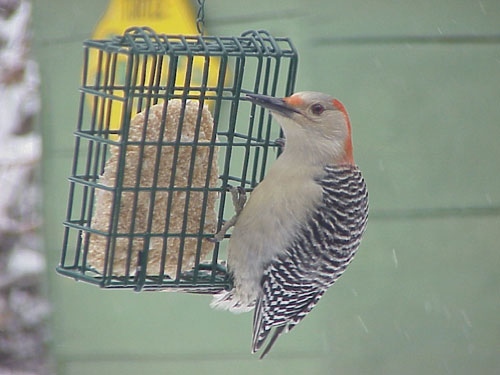
Red-bellied woodpecker, Melanerpes carolinus, at Estill Co., KY birdfeeder.
(*Photo by Sally Ramsdell)
October 2, 2013 Respect Resident Birds and Wildlife
We are all hospitable to visitors, but we often show less concern to permanent residents who really help define us for who we are. Numerous birds bear with us through the fits of upcoming winter's bitterness and deserve our praise and respect. All too often, we take those who are our permanent neighbors for granted -- and that means the non-migratory wildlife that has to endure our strange turns of possessiveness and selfishness.
October is one of the best of times to reflect on and show gratitude for those creatures that help define our region, for we need helpers to complete our tasks. We learn from wildlife, which remains in the region, how to bear down for the harder times ahead and to prepare ourselves properly for wintery weather coming.
This is an excerpt from Appalachian Sensations: A Journey through the Seasons for this month:
-----------------------------------
October -- Sounds of Coming and Going
The owl will hoot at the window
and the raven croak at the doorstep.
(Zephaniah 2:14b)
Appalachia, as sacred space, is a home to many creatures, each
with its own niche established a few millennia ago. We respect and greet wildlife that lives and moves and vocalizes around us both
day and night. Appalachia was their home long before human arrival; both permanent and transitory flying birds enliven our region, giving it a certain natural character. Land- and water-based wildlife have less mobility and are generally localized. The neo-tropical birds leave for warmer climates at the first sign of frost. These opportunistic inhabitants prefer milder temperatures whereas others such as cardinals and blue jays stay, make do with what is here, brighten the winter scenes, and keep us company throughout the year. We enjoy summer dwellers enlivening our lives by songs and chants, but appreciate hoot owls and other year-round residents all the more.
Some Appalachian folks exercise the same opportunistic instincts. Some go away for jobs and education; others stay through the harsh winters of life while neighbors flee to Florida. To each group, we show appreciation: for visitors who return to bless us with their temporary presence, for those who save energy when wintering elsewhere, but most sincerely for those who stay put and suffer with us through hard winter months to come.
---------------------
Prayer: Lord, help us learn from others how to prepare best for the winter season ahead. Give us a watchful eye to see things as they really are, and how always to be down-to-Earth in our everyday activities.

A sampling of apple pancakes.
(*Photo by Joana Petrova, Creative Commons)
October 3, 2013 Green Apple Pancakes
Healers of our wounded Earth ought to be good cooks. This means making nutritious meals that preserve nutrients and tastes and look appetizing, using locally-grown materials where possible, and conserving food byproducts in creative ways. A problem arose in every apple season: how to deal with the fallen apples before the ripe ones are ready. This year I harvested all green ones over one-inch in diameter, always mindful of a proverb we heard from youth: "Faster than a toilet-door spinner in green-apple time." This meant that the digestive tracks of apple-growers do not tolerate eating a chunky apple before ripe. Boiling the apple both kills any waste products from varmints that contaminate fallen fruit and distributes pulp evenly to help digestion -- provided it is not too large a dose. Instead of biting into forbidden green fruit, one mashes, strains off cores and seeds, and prepares it carefully to ensure no problems, and eats it in a very dispersed fashion.
My procedure has been to quarter and remove rotten spots from a dozen one-inch or larger green apples and boil in a quart of water for an hour or so until mushy. The pulp is pressed through a medium-sized strainer and allowed to cool; the more pressure in straining, the more pulp that is extracted. This may darken over time so you may wish to use quite quickly or add lemon juice. The green apple-sauce-making operation fills the kitchen with the smell of fresh apples a month or two before the actual harvest season, and is a harbinger of an upcoming fruitful season.
The pancakes are made in your own fashion with either prepared pancake mix or your choice flour ingredients. Both smell and taste are exquisite. Instead of using some water or milk as the liquid mixing agent, use the dilute apple sauce that may be sweetened in your own fashion, for the mix does not include available apple sugars of the ripened fruit. Eat in your own way. I do not like the pancake to be topped by sweetener but by chunky salsa or tomato sauces. Others may want honey, sorghum, maple syrup, yogurt, or non-sugar additions to polish off the pancakes.
Why bring this up on an earthhealing website? The reason is that a food product often wasted or allowed to go rotten becomes a seasonal food ingredient that saves the purchase or gathering of others, and gives both a flavorful aroma in cooking and with the apple taste that precedes the normal season. The crispy end product is an utter delight, but do go carefully for your digestive system may not be as tolerant as mine. Your comments are most welcome, if you seek to attempt next year green apple conservation measures. By the way, many of us use green tomatoes in cooking and find no fault and so we also use other items that are not yet in the ripened stage. Why not apples? I asked a prize-winning apple baker for prior advice and she seemed interested. How about you?
Prayer: Lord, help us never to waste food and to see that what we use is all for the betterment of all on this Earth.
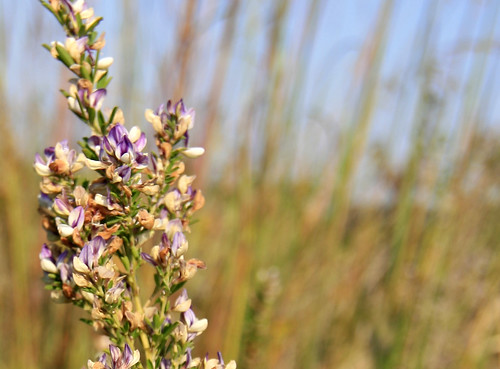
Sericea Lespedeza, Lespedeza cuneata.
(*photo credit)
October 4, 2013 Espousing a National Carbon Tax
On the Feast of St. Francis we ought to consider new ways of being kind to our Earth. No reflection has focused exclusively on a particular carbon tax, though in the past on cap-and-trade (a capitalistic maneuver) and other market-devised solutions for carbon dioxide reductions. Carbon tax suggestions have almost always been dismissed as dead upon arrival to a Congress vowing no new taxes -- even taxes to replace other less fair taxes (a perversity of democracy to a massive degree through unwarranted pledges). Lately, leading economists advocate a carbon tax that can even create a win-win situation. How is this possible?
People could be taxed for the amount of carbon dioxide they emit into the atmosphere and this could amount over the years to about a dollar a gallon for fuel. This may result in buyers turning to a fuel-efficient car or even a plug-in one that is recharged on solar energy. The added costs of the vehicle would easily be recouped over the life of the vehicle by economic savings in money, and most especially in the environment, where greenhouse gases simply must be severely curbed.
Economists add that the carbon taxes raised could be plowed back into renewable energy projects that would enhance their further development and ward off the critical global climate changes that are predicted by prophets of doom. The tax promoters add that these taxes could be used to offset income taxes and yet have a salutary effect with no NET increase in overall taxes -- just a reapportionment. That is good news to all but coal miners who will lose jobs over time -- much like buggy-makers who lost jobs when autos became popular in early 1900s. C'est la Vie!
Resource conservation through energy efficiency on all areas could be doubled easily, and the number of powerplants reduced from current levels. Wind and solar, along with hydropower and geothermal sources, should be more prominent in the energy mix than predicted a few years ago. Nuclear powerplants must be closed at the end of their useful lives (four this year) and no substitutes from that source as well. The time table also calls for reduction and elimination of fossil fuels in three decades. The carbon tax would hasten the demise of not only the dirty coal emissions, but also that of the new-found fracked natural gas and petroleum, though these are still needed in the petrochemical industry.
A caution to those who proclaim "no new taxes" from me, a fiscal conservative, who is more inclined to "no net tax increase." A rearrangement of taxes could have a salutary effect and so the reduction and elimination of some unfair burdens and a fairer distribution is preferable. Long-distance commuters will suffer, true -- for change always affects some. Taxes are burdensome and when fairly administered can be revolutionary in results.
Prayer: Lord, teach us justice and help us apply it as a
people to new tax policy and decision making.
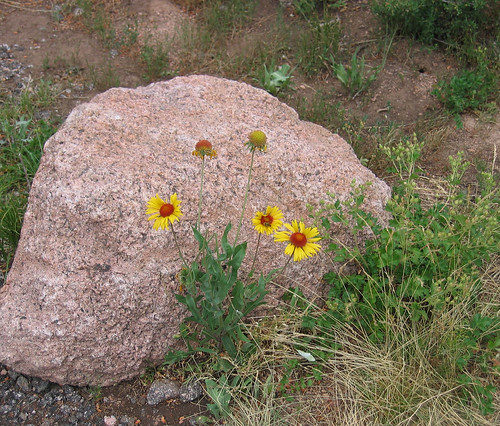
Nature's beauty in simplicity.
(*photo credit)
October 5, 2013 Celebrate Simple Lifestyle Day
Celebrations confirm our accumulating stages in life, inspire us to know the shortening of our lifespan, and encourage others to do the same. Simple Lifestyle Day ought to be celebrated, for it is in keeping with our 1975 book: 99 Ways to a Simple Lifestyle. For this special day let's consider four suggestions:
First, review simple living checklist (November 6, 2009) in abbreviated format: 1. Grow one's own food; 2. Drive energy efficient vehicles; 3. Install energy efficient bulbs; 4. Use appliances sparingly; 5. Use solar energy; 6. Heat and cool consistently; 7. Create green living space; 8. Recycle and reuse when possible; 9. Replace lawn with edible landscape/wildscape; and 10. Conserve water. The only modification on this four-year old checklist is to combine items 3 and 4 today into a single measure, and add the need to participate through letters and other communications with policy-makers in the light of looming climate. Likewise, we need to add energy conserving LEDs for lower priced lighting.
Second, celebrate and share a simple meal. Simple foods taste good and do not have to have exotic names or rare spices to be enjoyed. Throughout this year this website emphasizes the use of a single lower-priced food (peanuts in 2013, either as whole nut or in an oil or peanut butter forms) as a new daily meal item. This follows over the past four years what appears on this website for 365 soups, salads, and ways to use oatmeal in an old-fashioned rolled variety. The menu should be as creative as there are readers and does not have to be one's own creation if you prefer to use specific recipes by favorite cooks. Don't make matters worse.
Third, simply spread the word. While we live in a world of constant change and new gimmicks to try to make us spend our limited financial resources, we have ready access to many simple ways to live. Our world cries for sharing resources with those lacking essential needs. To tell why we must act simply is to celebrate our ability to share with others, something that gives meaning to our lives in many ways. The Internet allows this to be done at relatively low cost.
Fourth, show gratitude for simply seeing. We can give thanks for physical eyesight in viewing an October landscape; we add thanks for seeing simple ways, the insights of which even those optically blind may contemplate. Grace means gift and to show a graceful life means thanking God for all creation -- and there are more gifts than we can ever count. To dwell on our achievements omits that God is author of all good things; don't waste time. Let's be honest: we examine, share, speak, and see because we have the gifts to do so. Let's celebrate!
Prayer: Lord, teach us to continue to live simply in this ever more complex world and to constantly thank you for being privileged to live at this time on our troubled planet.

Eumeces laticeps, broadhead skink. Woodford Co., KY.
(*photo credit)
October 6, 2013 Faithfulness and Godly Service
When you have done all that you have been told to do, say,
"We are merely servants; we have done no more than our duty." (Luke 17:10)
Here is a parable of strong faith, a faith that recognizes the God who calls us. In one sense there is something very humbling about this story: a person inclined to democratic practices believes in doing what one feels free to do, and frankly finds this service to another citizen demeaning. Yes, if the ruler is human that may be the case, but we realize that God is King, not human beings. We serve God and God alone as absolute ruler. Now for democrats the parable has a new and fulfilling meaning.
God gives us a unique position on this Earth at this time and place. Our forefathers and mothers endured their callings with great and humble hearts. But they did not have our modern and current opportunities. We do not work alone but in solidarity with others seeking to bring about God's Kingdom. Jesus even speaks of the power of believers who say to the mulberry tree to be uprooted and planted in the sea. We must believe in greater feats, namely, saving our troubled Earth. The uprooted tree is not a dramatic event showing our power, but rather God's power working in us, so that the divine glory shines all the brighter.
We must trust the power of faith. Doing our duty seems small at first, but when seen in God's plan it has powerful qualities. Day laborers do what they are called to do, foreshadowing a greater calling to come. We do this out of love of God that gives an everlasting quality to the work performed. God is not the heartless master who expects work for his own honor and glory; rather, God is a lover who will reward what is done manyfold for the good of ALL. To serve one who is so great is to feel a pleasure in being faithful, for that means serving everyone as well. Our work is a loving sacrifice done with Christ and involves our participation. We are to see the lasting power of our efforts and when we make God the center, that power is all the greater.
Our trust comes through humble work. We have to do our part with enthusiasm, for God leads us. That means we do so with heart and hands and head and thus manifest the Trinity within us. To wait on Earth's table and help supply another's food needs requires heart, hands and head. By responding to our vocation we are empowered to witness to faith miracles, as instruments in the divine plan. We open ourselves to express our faith before others so they, in turn, can grow in Godliness. Then a mysterious and divine power boils up within us and our work in the confidence that God is with and in us in what we do.
Prayer: Lord, give us the humility to be good and faithful servants and in doing so discover divine empowerment within, a power so strong that our service has ever-deepening meaning in the world.

Mary in the garden. Historic Cane Ridge Meeting House. Paris, KY.
(*photo credit)
October 7, 2013 The Rosary as a Means of Reflection
Today is the feast of Our Lady of the Most Holy Rosary. For the unfamiliar, this is a period of pious devotion when words used are the memorized traditional prayers "Our Father," "Hail Mary" and "Glory Be" in a fivefold sequence of the Hail Marys after an introductory three. We begin with a Sign of the Cross and the "Apostles Creed." At each of the sequences or "decades" we announce the subject of meditative reflection on the life of Christ and our Lady -- Glorious (Sunday and Wednesday), Sorrowful (Tuesday and Friday), Joyful (Monday and Saturday), and Luminous (Thursday) Mysteries. The ending prayer is the also traditional "Hail Holy Queen."
Historically, on October 7, 1571 the allied Christian forces conquered the Turks at the sea battle of Lepanto in the Gulf of Corinth (the greatest battle of the century), and this was attributed to the intercession of Our Lady. That victory was so notable that only a few years later that date became the designated feast of Our Lady of the Rosary. At this and succeeding centuries individuals and families in Catholic countries regarded saying the rosary as a premier devotion. My mother never missed her daily Rosary until the very end of her life -- no matter how tired or how late it was that she got around to that period of prayer. Her fidelity to this devotion and to Our Lord and Our Lady made an indelible mark upon all who knew her. During Lent our entire family got down on our knees and said the Rosary together. My knees still ache.
This is the third anniversary of our Earthhealing editor Kristen Johannsen's death. I believe that she heightened my respect for this devotion of the Rosary, for her aunt and grandmother reminded me that she died on October 7th, the feast of the Rosary. At the end of her life, she returned to that devotion when on vacation with her family and friends. A circle of loved ones said the Rosary together when she was dying, and she joined in as best she could. In honesty, this was a most meaningful Rosary.
The time taken in reflecting on each mystery while in the process of praying the rote prayers is of special importance. The three repeated traditional prayers mentioned were prayed by the new Pope Francis when he came out to the public immediately after his election. As the new Bishop of Rome he said these prayers in Italian, most likely learned from his parents who prayed the Rosary. We ought to know them by heart in our own native languages as well, and allow them to become more meaningful by saying them with mysteries of Our Lord and Our Lady in mind.
Prayer: O God, whose only begotten Son, by his life, death and resurrection has purchased for us the rewards of eternal life, grant we beseech you, that, while meditating on these mysteries of the most holy Rosary of the Blessed Virgin Mary, we may imitate what they contain, and obtain what they promise. Through the same Christ our Lord. Amen.
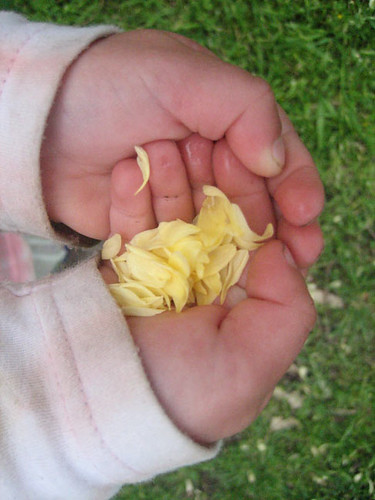
Rose petals in a child's hands.
October 8, 2013 Children As Rebels or Revolutionaries
Today is National Children's Day, a day that we give for our collective aspirations for a future generation where hopes and dreams can be realized. The future is before them and that draws youth together from all parts of the world as, for example, they gathered by the hundreds of thousands in Rio in July.
The standard argument is that children ought to be more like their parents, and the world would be better. Truly? The ability of parents to move still further up the economic ladder has been somewhat restricted in the last three decades as better paying jobs dried up and new ones never materialized. Rapidly rising costs of education blocks some of the former easy routes to financial success. Many parents have great anxiety as to how their children will turn out in life and thus strive to implant their work ethic and traditions in hopes of raising their offspring's success possibilities. Are there some fallacies attached here? Do we want tomorrow's citizens to be carbon copies of today's? Hardly. Our wounded Earth deserves far more if it is to have future viability.
If we are called to be revolutionaries in the Pope Francis way of seeing our spiritual future, then we expect our children to be called as well. How soon should they start preparing themselves? Or have they have already started, and we must open our eyes to see revolt in its most current manifestation (stirring in the Middle East, Europe, and even Occupy Wall Street). It is something impossible to stop when fueled by 300 million unemployed in this world. The genie cannot be put back into the bottle. Discontent with the present situation is pronounced in the younger generation, and this is highly likely to grow during the coming years.
The American dream for upward mobility to wealthier possibilities fades before our eyes. Perhaps it was too childish to start with. To be materially better than a highly wasteful generation would only spoil our fragile planet -- and that is not a good legacy. To revolt is to question the current motivation toward materialistic goals. One positive aspect of the Occupy Wall Street movement was a willingness to share with all present, regardless of status; it looked to replace the consumer culture of high resource use and selfish demands on Mother Earth with a life of freedom for all through mutual sharing. Goals were not fully articulated by different motivations from a competitive rat race.
Youth will most likely revolt against a motivation that is totally materialistic, and they may seek something higher. The opportunity is to forsake materialistic aspirations of success-oriented parents and seek in solidarity with the world's poor. Revolution means change needed to save our wounded Earth.
Prayer: Lord, give us the insight to encourage youth to fulfill their aspirations and to find the means to achieve what is
so lacking in our older generation.
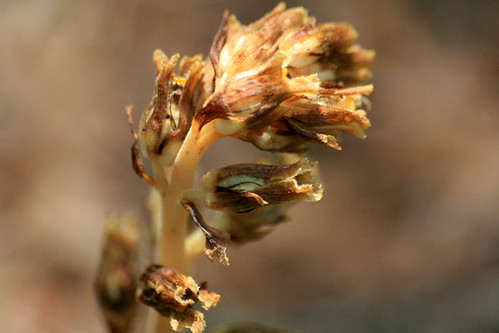
Pinesap, Monotropa hypopithys.
(*photo credit)
October 9, 2013 Household Compromise of Sound and Silence
The great art and challenge of compromise is first experienced within the home, where some noises are natural (a crying baby) and some can merely require the turning down of volume from an electronic device. The art is not to allow chaos or to rule through absolute silence, but to give way to time and space for both environmental components of life -- sound and silence, a major issue worth pondering in Reclaiming the Commons (Chapter Seven):
---------------------------
We need silent space; we need quiet time to meditate and reflect. Both time and space constitute a "sacred silence" that allows us to turn our hearts to God. Just as music needs stops and rests, so does life. Leisure advocates say: take rest breaks during the work day to gain strength and energy to keep on top of assignments; make the day of rest truly restful; create both sacred space and sacred time in your life, where and when different senses can harmonize sights, sounds, smells, tastes, and feelings; find retreat time and use it.
Homemakers can establish quiet places and times for internal peace, reduced stress, and improved wellbeing by several steps:
* turn down volume or use headphones;
* dampen or replace noisy appliances and other devices;
* establish TV-cut-offs (mute button) for commercials;
* abandon cell phones (or turn off the ringer) during meals;
* erect privacy and sound barriers using various types of material (stone, wood, metal, or vegetative), thickness and height, and manner of construction;
* mow lawns with a muscle-powered mower or turn space into edible landscape or wildscape;
* enhance soundproofing in parts of the home or create a quiet nook for reading and listening to music. Egg cartons tastefully dyed and arranged can be low-cost materials for quieting the special room or nook. One commercial acoustical product for ceiling and walls is a fused vinyl material called Audioseal, a very dense material costing several dollars per square foot as non-reinforced rolls, and double cast for reinforced rolls that can be available for retrofitting structures with noise problems; and
* add insulated enclosures to dampen noisy devices that can even cause structural vibration -- air conditioners, water pumps and purifying equipment, outdoor by-pass pumps, natural gas compressors, and heating and ventilation equipment.
----------------
Homemakers may encourage children's playful squeals and shouts in the great outdoors during daylight and within limited hours, so neighbors can rest quietly at other times (night and rare daylight times as well). Fireworks are limited to major holidays and within acceptable bounds. Children ought to be encouraged to let off steam and get sunlight and fresh air within limited periods.
Prayer: Lord, help us be tolerant to those needing quiet place and time and those who need to sound off in play.

Autmn migration of monarch, Danaus plexippus, in Kentucky.
(*photo credit)
October 10, 2013 Press for National Gun Licensing
On World Mental Health Day we consider ways of reducing stress and improving the mental health of our country. One way is to begin a process of gun control that will reduce the Environmental Gun Threat (EGT) that plagues many in this country.
To assume that all who own guns will use them properly is a false assumption; and others of the community of nations seem more aware of this than American citizens. An individualized interpretation of a properly regulated militia's right to bear arms (2nd Amendment to the U.S. Constitution) does not mean allowing uncontrolled crazies to acquire and use arsenals. Many, especially in urban areas, accept that gun control is necessary for a healthy society as much as we want only licensed and mentally capable auto drivers to use our highways. Acquiring driver licenses is bothersome until we remember that this helps all of us move more safely from one place to another. Certainly, bureaucracy and increased insurance bills come into the discussion, but still these procedures are not extremes. Removing barriers improves traffic flow and forbidding certain practices (e.g., no driver texting) ensures safer conditions and prevents additional traffic accidents.
Good order makes some form of control on guns imperative. Unfortunately, such gun regulations have been loosened in some states in recent years with the heavy stress from red states to abide by tea party demands for less government. The bogus argument of the "slippery slope of more regulation" hardly stands before the counter argument of greater safety in a neighborhood. Why not a national license on guns? Actually, lack of citizen control is NOT a true conservative issue but the very opposite. Permissiveness of individuals is a false liberality that allows individuals to bear assault weapons and abandon single-shot, muzzle-loading guns. Assault weapons with immense firepower were not traditional individualized fire arms at the time of the Constitution's drafting, nor ought they to be now. They are to be forbidden, not licensed. Users of guns for entertainment or so-called "security" ought to be licensed after taking basic training for use.
Mentally incompetent James Holmes reportedly used an AK-15 in his rampage in July, 2012 at Aurora Colorado. In reality, only police and institutional and utility guards in a given locality ought to be so designated to carry military-style weapons. Why the "right" of hunters to automatic weapons? Are they actually that poor a shot? Currently loopholes in the regulations allow for trafficking in weapons with gangs and drug operators and just about anyone. Some call for more efficient gun law enforcement, but what about reviewing "Stand Your Ground" laws now on the books in about two dozen states. Granted, no licensing system could be so thorough as to screen out all misfits. Nor can we expect total law enforcement. However, licensing could go a long way in excluding those unsuited to carry or possess firearms.
Prayer: Lord, Help America come to its senses on gun control.

Pinson mounds (Middle Woodland Period). Pinson, TN.
(*photo credit)
October 11, 2013 Sharing Economy: Collaborative Consumption Model
Today, a new model in the field of consumption is emerging, and this is based on a desire not to own but to rent things that we use only occasionally. In a broad range of everyday items it would be better to pay for use of another's item or to share expenses. Actually, the process is not new in our modern society; we rent cars when traveling locally at distant places, and we rent motels for short periods when we lodge elsewhere overnight. The practice is extending to utilize un- or underused private vehicles and residences, and extends to a host of other goods and services.
Farmers and certain businesses and industries rent heavy equipment and implements that would be too expensive to maintain on one's own (e.g., threshers, combines, seed cleaning equipment, spraying gear, etc.). The same applies to construction companies and to industry and includes earth-moving equipment, concrete mixers, and cranes. Homemakers know this is the informal manner with Dagwood Bumstead's friend who always borrows tools.
Green business confronts a consumption economy and here is where environmentalists take notice. In fact, sharing infrequently used materials requires far less resources than all having these at too many locations. However, the idea has always been opposed by consumer culture businesses that want all to sell more ladders, spraying lawn mowers, sawmills, chainsaws, etc. But in a world of far too many consumer products with the heavy cost of resources to process and deliver these, along with resultant pollution and end use disposal, let's cut consumption at the source -- the "Collaborative Consumption Model" (CCM) is a beginning.
Growth potential for CCM is sizeable, even in billions of dollars on a national or global level; it offers a livelihood for business-minded people who can connect through the Internet. Why buy and store what is needed only once a year and can be obtained for a brief period at low cost? Safeguards can be spelled out before use. Bringing together suppliers and demanders makes for a bright business future even on an international level. Nightly, one company now rents out 40,000 unused rooms throughout the world. Now hotel managers may not like this and may even require local regulations as to insurance, taxes, safeguards, and care that would help save their own current business.
New ways of thinking mean new challenges. The listing of CCM items is endless -- cars, bikes, furnishings, electronic devices, bedrooms, tools, storage space, printers, yards, lawns, and on and on. Certainly, items wear and are damaged in use. The key is who needs something and who has something that others may want for a short period, that is, host connected with customer. Information on supply and need is now easily available through the Internet to a global set of interested parties.
Prayer: Lord, help us share with others the things we have in
excess, and to answer our needs through other's bounty.

Emergence from forest floor after October rain.
(*photo credit)
October 12, 2013 Natural Recycling All Around Us
Nature has a way of reusing materials efficiently and is worthy of imitation. In fact, through observation we gain insight into what natural processes are at work all around us that bring about the changes that keeps everything in balance. Through our senses of seeing, hearing, tasting, smelling and feeling we learn about how the falling leaves are being converted through natural processes into next year's raw materials -- natural renewal. This phenomenon is celebrated in our book Appalachian Sensations: A Journey through the Seasons:
----------------------
October -- Sensing the Presence of Wet Autumn Leaves
I will fall like dew on Israel.
They shall bloom like the lily,
and thrust out roots like the poplar,
their shoots will spread far;
they will have the beauty of the olive
and the fragrance of Lebanon. (Hosea 14:5‑7)
The warmer daylight span is shortening and night's coolness is
increasing. Breezes creep up from the valleys to the higher reaches of the hills; the fog clings to us more closely; the frost
scampers rapidly across the landscape. Autumn leaves flutter to the ground with a rustling sound when they land. With global warming, the foliage that once fell by the end of October continues well into November. These falling leaves return to humus and emit a characteristic autumn scent telling us that nature is going to sleep awhile.
Lessons are learned through sight and sound but are never as pronounced as those learned through the sense of smell. Nature beckons us gently through its teaching mode to accept the seasons, and to recycle cast-off portions of life for a new beginning. If we see that our "wastes," our unwanted leftovers, are of great worth, we will take pains to recycle all consumer products. We will not store these up as junk, nor burn them as trash, or despair and send them to landfills. The leaf cycle teaches us to call nothing waste, but recycle all for future utility.
---------------------
Prayer: Lord, give us the grace to see nature at work all around us, to pay attention through our senses to Earth's busy recycling process, and to await in hope the future coming of springtime. Teach us to see our current but mortal works and services as the source of life for future generations.

The miracle of a sunset.
(*photo credit)
October 13, 2013 Thanks for Everyday Miracles
There are two ways of living your life
one is as though nothing is a miracle,
the other is as though everything is a miracle.
(Albert Einstein)
Haydn's 96, the "Miracle Symphony," was really not the one being played when at the intermission the audience crowded to the stage to hear the composer; at that moment the giant chandelier fell from the ceiling to where many were seated minutes before -- but no one was hurt. The audience regarded this as a miracle. We are all on one or other occasion at an event where a miracle occurs, but how do we react and attribute the phenomenon? Is it luck or the work of God or something else?
We read again the miraculous healing of the ten lepers (Luke 17:11-19), for it involves a gift from God that only one of the healed lepers acknowledges as a miraculous event, and returns to give thanks. If we suffer in any way and recognize the significance of our improvement, we enter more deeply into the miracle of life and come to appreciate wellness all the more. Having communication for another who suffers opens us to their world, sharing what they have to offer us through compassion. We discover a privilege in joining them and their co-suffering; we have an opportunity to encourage them through gratitude.
Sharing and appreciating little gifts is the stepping stone to an atmosphere of gratitude, a ministry open to everyone who lives. In the story of the ten lepers, at least one person knows where the gift of healing comes from, and this foreigner takes time to return and show a sense of gratitude to Christ. For him, the duty is first to the giver of good gifts; only then is that a ritual cleansing that made lepers free to travel within the culture that requires active lepers to live separately. Praise God, for one sees it properly. Giving thanks is our greatest act of freedom, and for this we are created human beings with free will. To say unsolicited thanks is to praise God profoundly.
Another way of interpreting the reading is one of enthusiastic participation in the glory of creation and re-creation. In this view there is light-heartedness, much as at the Easter episodes. Joy gives rise to being less severe and thus a demanded gratitude by a severe mind is not present. "I thought there were ten and only one returned -- and the foreigner." The disappointment for not recognizing a miracle is certainly human but not severe; the recognition of healing is truly a Godly act. We are called to appreciate the small and great things of life, for miracles and faith exist side by side. Our remaining in Faith can be regarded as that gift from God that is a miracle -- "Your faith has saved you." God invites us to be participants involving our free response to a grand moment of creation to which we say "Thank you."
Prayer: Lord, is our faith a gift and our perseverance a
miracle? Deepen our faith and make firm our persevering insight.

Purple passionflower, Passiflora incarnata, Anderson Co., KY.
(*photo credit)
October 14, 2013 Rediscovering America with Gratitude
On Columbus Day we ought to do some further reflection on the "discovery of America" -- or the Native Americans "discovery of European invaders." When Columbus completed a highly risky Atlantic crossing, gratitude was certainly in order and was expressed. Good enough! Or was it good enough? We are quick to give thanks in public ways upon completing a portion of life's journey, but is that sufficient? What about our broader existence and those who made our journey possible? What about the ones who support us on our way in life in hidden ways? What about gratitude to the God who gives us breath and invites us to proceed properly?
Limitations abound in every journey and the Columbus trip certainly had them. In fact, as a Knight of Columbus, I am always intrigued about the good man's life but always find it baffling. The drive to gain material success (due to financial obligations and personal motivation) always seems something that Christopher sought and never fully found. The gratitude of that first leg of the journey melted when the goals of sought gold and riches evaded the discoverer. A lack of success on life's journey can tempt one to forget the atmosphere of gratitude that should permeate all that we do. And America's discovery included thanks and exploitation.
Exploitation meant the hidden agenda of the new discovery became public through treatment of places and ones "discovered." The agenda included actions by people who failed to show proper respect for inhabitants met in the New World, and so enslavement and harsh treatment soon ensued. People driven by the quest for material things turned the discovery into a series of conquests that were something short-sighted. Ingratitude soon replaced the first signs of thanks with a yearning to get discovered wealth for gain whether that be gold, furs, codfish, timber, or tobacco. European exploitation tarnished that gratitude for God' gifts and human respect for a native culture with its own cultural gifts. All this was amplified by the arrogance of those with firearms against a population living with bows and arrows.
Rediscovery involves our reading the history of that period of coming together of a world not known before 1492. We can discover more about ourselves and find that the shortcomings of materialistic motivations of the early explorers can carry down through the ages. Disrespect for those enslaved by colonists became a lesson for us all as did hidden disease, extended warfare, and other ills. Ungratefulness and exploitation ran hand in hand. That extended down through an industrial revolution and modern consumer culture to include enslavement of the resources of our world. A challenge is to rediscover those first moments of true thanksgiving. We need to be authentically thankful even when exploiters give only lip service and regard their own success as idols. It is time that we rediscover a grateful America.
Prayer: Lord, allow us to find time to say thanks after discovering our interior New World through purified motivation.
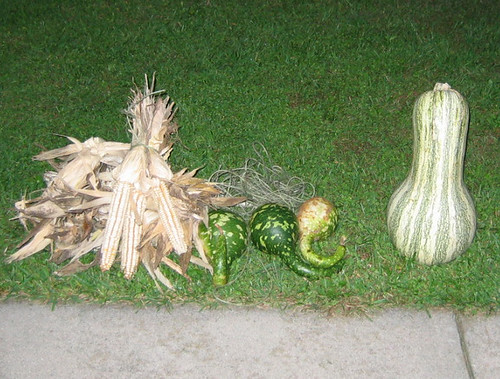
Autumn harvest in Kentucky.
(*photo credit)
October 15, 2013 Harvest Time and Nutrition for Poor Folks
Today, look into your own backyard at local food needs. While we focus on the local needs we recall that tomorrow is World Food Day. Here at the foothills of the vast Midwest the harvest season is in full swing with corn and soybeans going by the truckloads to barns and grain bins. Pause and thank God for the bounty of adequate moisture in America's food-growing belt. The production is generous, but is the ultimate distribution?
Here in Appalachia we realize that sufficient food does not mean the right type of food distribution, preparation, and use. Take a trip to the local commercial food market and compare price tags for bulk food (grain, fruit, nuts, berries, and vegetables) with easily accessible and readily edible junk food -- sugar products and those with excessive fat. In realizing what people will pick up and choose to eat with their food stamps is part of the cause of an emerging obesity epidemic. The nutritionally aware forget that the poor have less time and skill to prepare foods from scratch and so their choices of candy bars, soft drinks, and chips have a logic associated. With compassion we start to understand how people acquire poor eating habits.
Restrict food stamp content but not amount. Is there any need that food stamp holders purchase soft drinks by the cart load at the start of the month and then convert some of this into cash for other habits -- at public expense? In some states this is a forbidden practice. Drinks are not foods, and anyone thirsting for potable water ought to get it free of change -- but don't call the sugar-laden soft drinks "food" under any stretch of imagination. Interestingly, this is the largest food item in the purchases of the poor folks in this part of Appalachia -- in a region with the highest soft drink consumption. Petition drives to remove soft drinks is fought bitterly by the beverage producers.
Teach good nutrition. Our own parish "Moms in the Morning" is the contribution of Our Lady of the Mountains at Stanton for providing good nutrition over time. Balanced school nutrition programs are seeking to tackle the obesity rates among youth, and some improvements have been made recently in five American states including West Virginia. Too much of a good thing can be bad if any population indulges in junk food.
Institute basic food distribution programs. Occasionally in the past, food commodities have been and are released -- and this is welcome by those of low income. A number of basic items (cheese, peanut butter, canned foods) are distributed to the needy on a regular basis as a food stamp supplement. Low income families (especially those with numerous dependents) find staples such as low-priced milk helpful. More plentiful staples become the opportunity for creative cooks to shine in their glory.
Prayer: Lord, give us the energy and patience to defend all who need food education and skills in food choice and preparation.

An assemblage of wild mushrooms.
(*photo credit)
October 16, 2013 Focus on World Food Needs in 2013
Each year on World Food Day we gather the concerns that are present in our world and try to summarize them in some fashion. In the process we leave some out, due in part to our difficulty in distinguishing those with real or phony needs. Unfortunately, in my two parishes we have both types of people, and these make further demands on our spiritual development along with our donor supplies. Since our world is our enlarged neighborhood, needs at the local level are multiplied manyfold when considering the world with one billion extremely poor folk.
Transparency in exports is a necessity, especially since many do not want foods that have certain pesticide residues or those who oppose GMO-grown materials. Citizens will come to their own conclusions as to the degree of safety of some of these materials, but it is important that consumers can make wise choices.
Global lunch programs are an ideal that was promised at the start of this century. We hear that 23 kids in Bihar, India's poor state, were killed from poisoning by pesticides in the school nutrition program, but recall that India feeds 125 million students with a generally good record. Beyond India we hope the 65 million youth outside of formal education throughout the world will have safe nutrition programs along with accessible school facilities.
World storage centers need to be expanded, even though these are already integral to a global food-feeding program when shortages occur through drought or other calamities. While famine is not prominent, still hunger is and worse conditions arise quickly and need rapid response. Today, over 25 million refugees including four million in or from Syria need supplies; this situation stretches the UN food programs to the limit.
Protect against agribusiness programs. This is often overlooked amidst promises of mass production of food or industrial commodities (such as palm oil or beef) for wealthier lands. Such situations hurt environment and local subsistence farmers.
Support small farmers throughout the world and especially in Africa where challenges in meeting local food needs exist. This calls for more than "charity;" in recent years the emphasis is on programs to offer infrastructure (roads, markets, etc.) assistance to small farmers for them to get their homegrown produce to market.
Biofuels from food stock (corn and sugar) must be discouraged because shortages by diversion to fuel affect prices in distant lands as well as more locally. One effort that has not been accelerating as originally planned a decade ago is converting cellulosic fibers from farm and other product wastes to biofuels. This program offers immense promise without curbing traditional agricultural production for human food and animal feed.
Prayer: Lord, Give us this day our daily bread.

Autumn view at water's edge.
(*photo credit)
October 17, 2013 What Triggers Global Protesting?
You are the ones who destroy the vineyard and conceal what you have stolen from the poor. By what right do you crush my people and grind the faces of the poor? (Isaiah 14b-15a)
Today is World Day to Overcome Extreme Poverty. This is a fitting time to reflect on what is causing this to be a year somewhat like 1848, 1968, and 1989; those were years when change was in the air and people were drawn to the streets to protest a host of popular issues. However, catalytic issues seem to be different in Turkey (greenspace in a park) than in Brazil (bus fares) and on and on. On virtually every continent surging masses incited by social media rise, even though the immediate cause of anger may appear to be different. Emotion and reason do not simultaneously mix for inevitably successful resolutions. The mood is not pretty and not one easily resolved.
In this time of radical social change and fiscal difficulties one must recognize that three hundred million unemployed are not going to sit back; the call by the superrich and status quo seekers for more caution is met by less and less patience on the part of those who can and will protest -- though not necessarily by the one billion who are still in extreme poverty. Those who have received a fair education and cannot find work are tinder for an explosive condition. Patience is wearing thin. Change is in the air and leaders of governments are starting to take notice. The poor are like the tinder and those who cannot find work are like the hot coals of discord. Hope springs in the hearts of those who sense through an implicit solidarity that a better world is possible. There are not enough police to counter the flames of social media.
Here we hear the words of Pope Francis in mid-year: A Christian who is not a revolutionary today isn't a Christian. When we processed this earlier we said that this is worth reflection leading to action -- and "social patience" is not Christian. The principle in the past is that if injustice is directed against me as a person, the Spirit may direct me to patient acceptance; if against another, we must protest in every way we can with holy impatience. Even Mary, other holy women, and John protested by standing beneath the cross while the rest of the apostles went and hid. With the oils of Confirmation on our forehead we cannot remain silent to social injustice. This is why protest within the hearts of many must be channeled, not suppressed.
Extreme wealth and extreme poverty cannot co-exist side by side. Friction develops naturally, and this expresses itself in numerous ways for human brotherhood is threatened. Inequalities become a charged situation demanding attention. The conditions are ripe for revolution unless those who have much are willing to surrender some of what they have for those who lack. We cannot allow injustice to our brothers and sisters to go unchallenged.
Prayer: Holy Spirit, give us the courage to act here and now.
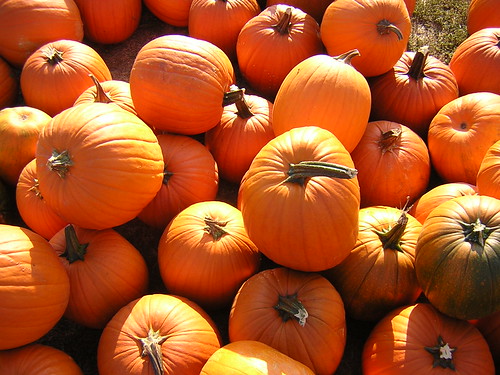
Pumpkins galore!
(*Photo by Richard Bowen, Creative Commons)
October 18, 2013 Pumpkins: A Truly American Delight
Pumpkin, that beautiful orange fruit of the autumn field, is really more American than apple pie -- for it is a native plant. This pronounced gourd-like squash of the genus Cucurbita is often associated with Squash and gourds and other members in growing and food-preparing practices. But there is more to pumpkins.
Decorating with pumpkins is an American art form. This is the ideal season for using colorful pumpkins for decorating motifs at homes and offices. The pumpkin resembles a human head, thus opening it to a variety of artistic expressions; the creativity includes carving into Jack-o-lanterns with a candle in the middle.
Growing pumpkins are usually in the 20- to 40-pound variety, though I have a distant cousin in Ohio (Martin Schumacher) who is known to grow some of the nation's largest, requiring a mechanical lift to put them on a truck to county fair, and getting them highlighted in seed catalogs. Pumpkins take space to grow since the vine moves about at will and is certainly not the produce of choice for small space gardeners. We at ASPI had a relatively large garden space two decades ago in a river bottom, and we devoted it for one season to pumpkins. It yielded a truck load of moderate- to large-sized ones. The problem was that many had small smooth indentations in the side and, though some had been busted open, these were not broken. The mystery was that deer bucks with large antlers would charge and attempt to break open the pumpkin to get at the delightful seeds; and pumpkin survivors, except for small indentures that did not break the skin, were suitable for culinary and decorating purposes. A wildlife imprint!
Storing pumpkins is relatively easy and well known by early Native American growers who specialized in gathering and using various members of the squash family for dippers, food containers, and as food. Pumpkins are a food that can withstand temperature changes and still be fresh during the winter well beyond the growing season. They can be put in a root cellar; the pulp portion can be canned or frozen and seeds dried and stored.
Preparing pumpkins for culinary dishes can prove quite creative since the size of pumpkins indicates plentitude. The taste is not as pronounced as other fruits and so spices assist in pie preparation, especially those prepared for American Christmas and Thanksgiving feasts according to favorite recipes; these pies are often served with whipped cream or ice cream. Pumpkins are also incorporated into breads, muffins, candies, cakes, cookies, and stews as a meat substitute. A happy discovery in the year of soup variety was the good taste of pumpkin soup (with spices). We once prepared a pumpkin Thanksgiving "turkey" but the creation was not equal to the real thing. The seeds (the goal of the charging deer) can be roasted and used as a good snack or part of trail mix.
Prayer: Lord, allow us to find joy in the fruits of our Earth
and to think of ways of making them more enjoyable.

Sandhill cranes, Grus canadensis.
(*photo credit)
October 19, 2013 Bullying: A Local and National Phenomenon
During this initial writing on bullying, NPR reported on Chicago school closings being ordered by the mayor. One protestor said the mayor ought to get "the bullet" and not the vote. The remark was casual and went without reporters' comments; it sounded as though to shoot an opponent was standard practice. Was this a threat on a mayor's life? NPR was not apparently disturbed, nor the audience in our gun-filled society. We either allow threats as though an everyday occurrence, or we are too bullied to break silence. Let us reflect on attitudes related to this practice.
Bullying comes in many ways and is a weapon of power. When accompanied by guns the power is magnified. Even the possibility that a bully will resort to arms intensifies the practice. Author Lisa Alther quotes in her book Blood Feud a reporter during the quite infamous nineteenth century Appalachian Hatfield and McCoy feud: "The majority of the people here are peaceably inclined, but are overawed and domineered by the bullying element." One feud leader, Devil Anse Hatfield, appeared a master at the art of bullying and this included West Virginia's governor.
During times of feuding and quarrels a person may initially refuse to fight back and this encourages use of weapons by either the bully or the one who is the brunt of the actions. Reactions can be as drastic as the original action. Bullying is competition gone awry. Bullies try to impose their will over others through forceful action or hostile language communicated in order to get results contrary to the victim's will. In this age of easy social contacts (Facebook or Twitter), bullying becomes a challenging problem. It's easy to threaten another by revealing a real or hypothetical story that imputes another's character. How about smearing the disliked by publicizing through powerful social media?
This act of bullying can affect legislators in the same way as does personal and local conflicts. The wealthy can become bullies in a permissive society that allows them to retain their wealth and use it as legislative power. Those with powerful lethal weapons or financial resources are easily tempted to exert power over another. Guns speak when holders exercise a rather silent bully pulpit, for weapons have a certain advantage when exercising abusive power over others; this is true in unsafe neighborhoods or legislators paralyzed by difficult global climate change issues.
Recall how many American massacres involve newly minted counter bullies with older assault weapons. Internet, as well as person-to-person bullying, should never be tolerated and every effort taken to see that such practices cease. This is more easily said than done, especially in a society that has faced bullying in a massive degree. Yes, it is still "legal" to bully through bribes and contributions, since bullies helped influence the legislation.
Prayer: Lord, give us the courage to withstand bullies whether those with guns or with wealth.

Thin-leaved coneflower, Rudbeckia triloba.
(*photo credit)
October 20, 2013 The Struggle to Remain Faithful Today
When the Son of Man comes, will he find faith on earth?
(Luke 18: 1-8)
The issue raised in today's Gospel reading is worth special reflection during this year of faith. The parable is about the persistent widow who seeks a decision from a distracted judge. Perhaps our position is closer to the judge than the persistent person, for we so often assent to a bureaucrat's caution.
Persistence has a quality of continuity and that is not to be overlooked in our busy world that takes us from one matter of attention to the next. We are too distracted to focus on a single issue -- the issue of our fidelity to God. This makes us fail to see the value of faithful dependence on God and not be fair weather folks, failing to seek spiritual direction until a storm threatens. God always is open and listening, but we choose times of immediate fright and soon lapse into forgetfulness right after the storm passes. On the other hand, the persistent person does not forget but is ever faithful in prayer and mental attitudes.
Gratitude reinforces fidelity. The first shows that we know that faith is a God-given gift that requires continual nurture. Lacking a sense of thankfulness is lack of faith that God will provide and we are immersed in an atmosphere of divine grace. Furthermore, fidelity to God as author of good gifts shows that we understand the full nature of these gifts and are willing to constantly acknowledge God's generosity and mercy in our public lives for all to see.
Ingratitude accompanies busyness. On the other hand when we strive to gain material things in this world's ongoing rat race, we turn from a sense of gift from Another (God) to one where I feel deserving due to my luck, hard work, or native intelligence. Thinking that these successes are solely the result of my efforts turns me away from God the author of all; in such circumstances self-centered attention takes hold, and the strength to resist evil erodes. Material success becomes a goal and devours our precious time. We become socially addicted to such material things and lack the ability to discern clearly right from wrong. Is this the lack of faith that Jesus is talking about?
Prayer is the answer. Christ teaches us to pray always for what it takes to succeed. God promises answering our prayers in ways we cannot fathom. Are we willing to continue to pray, trusting that God is attending to our petitions now or very soon? Shouldn't we pray that we hear and understand God's answers? In God's good time prayers will be answered -- and thus we gain a childlike trust in the good hand of God in our lives. We can await with trusting hearts even amid the busyness all around us.
Prayer: Lord, help us to persevere in our faith journey and to trust that you alone can give us comfort.

Bear Glacier panorama. Near Stewart, British Columbia.
(*photo credit)
October 21, 2013 HERE is a Troubled Earth
October is a fitting time for the following four reflections leading up to a manifesto at week's end. For one thing, this is a time of untold beauty as the forests change here in peak color on this third Monday of October (though it differs from place or places). Amid this beauty we know that troubles beset this and every part of our fragile Earth. We see Calvary today and we hear the Lord's words, "Look what they have done to our Earth!"
a) We are immersed in Mystery. Earth before us is both beautiful and fragile. No doubt, each of us has been elevated to sheer beauty during this season -- hills and lakes, trees and flowers -- wildlife and people. We are overwhelmed by the grand beauty of God's Creation when we immerse ourselves in nature. But mere observation does not suffice, if only focused on the untouched or by avoiding the sites of marred beauty. Sensitivity means simultaneously seeing both beauty and ugliness, to hearing the sounds of harmony and the cry of the poor.
b) Humbly, we come and see. Our own personal salvation rests on what we must do to see what has to be done. If we fail to see through our neglect, we are condemned by the sin of omission and in ignoring the needs of others. Simply knowing the condition that has occurred is a preliminary step of which others must necessarily follow. The call is for us to open our eyes and ears and, like the Good Samaritan, to not let this pass unattended through denial, excuse, or escape from an observer's point of view.
c) Damage to a fragile Earth confronts us. We cannot remain in silence and acquiescence (agreement and consent without protest) to this condition. We must do something and thus we confront powerful forces leading us to deny the situation. We look about and see that people, even legislators, are being bullied by the status quo seekers and big fossil fuel producers. To beg for their help is to lead us to the material whelms of frozen status quo -- and the answers do not come from the affluent.
d) Salvation is needed HERE. Earth is not meant to be wasted, for all of God's creation is good. We Christians believe that the Savior has come, but we hear in Paul's words that we are to fill up what is wanting in this salvation event -- a suffering Earth. We are part of the saving act and, as the hands and feet of Jesus, we participate in what is happening in our midst. We have a personal responsibility; we must answer in some fashion and not expect a divine intervention to come forth and save what we have messed up so royally. We are responsible for our faults. Note: The First Week of the Spiritual Exercises.
Prayer: Lord, forgive us for what we have done as part of those who damage our Earth and/or our failure to stop this from occurring. Thanks for allowing us an opportunity to live in
these troubled times and help bring about needed changes.
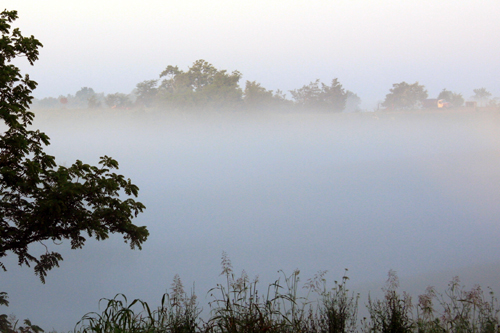
Misty morning, Kentucky in October.
(*photo credit)
October 22, 2013 NOW A Fundamental Option Is with the Poor
In urgent times, we seek to focus on what is essential for those in need. Excuse is insufficient; we come forward and show a willingness to take part and not expect others to handle the situation. Here poor Earth and poor people are the primary focus, and we look about to see how we can enter the struggle, not accepting that our personal salvation is removed from that of others. Suffering people and Earth are a single community.
a) Urgency confronts us NOW. We cannot back away and refuse to enter the fray, lest this lead to ruin for this planetary community. Our wounded Earth must be saved HERE and NOW from the hands of a consumer economy, bent on continued pollution and waste of resources along with the risk of catastrophic climate change. We have a shrinking time to act before disaster occurs. There is no time to waste.
b) Initial actions are imperfect. To strike out violently in our holy anger is not sufficient, for violence only leads to more suffering. We cannot panic, but we know that individual agents of change are limited in the manner of response, a second level of eco-humility. But we cannot excuse ourselves and so we start to act even with limited resources. We confront poverty and suffering and strive to bring about healing by addressing pollution and injustices through remedial action. However, our limitations confront us: lack of expertise, self-control, purity of intention. What we strive to do for the poor (people and Earth) has limited effectiveness within a materialistic culture in which we are part.
c) The manner in which we act is critical. We cannot waste time and energy. Choices include inviting the wealthy to freely give up what they cling to or to humor their power trip of dispensing "charity." Some few will give freely and entirely but most will not. Continued disparity of wealth causes discontent, and so nonviolent methods must be used to reclaim the commons, to loosen the hold by wealthy nobles on resources needed to change our world. A democratic people must retake what belongs to the commons so that an authentic healing might occur.
d) The poor hold a key. While poor people lack material resources, merely supplying these is not sufficient. Looking more deeply, we discover that the poor have richness in their utter trust in God -- and this strikes us deeply. The affluent do not have answers whereas those acknowledged as poor have a spiritual power to change -- and as Scripture says God is with them. The key is Mary's words: God will pull down princes from their thrones and exalt the lowly (Luke 1:52). It is the rising of the poor in God's grace that will bring about a profound change. But this rising requires the cooperative action of many, a solidarity with the poor. Note: The Second Week of the Spiritual Exercises.
Prayer: Lord, allow our sense of urgency to grow when we see and realize the poor hold a key to addressing this time of urgency.
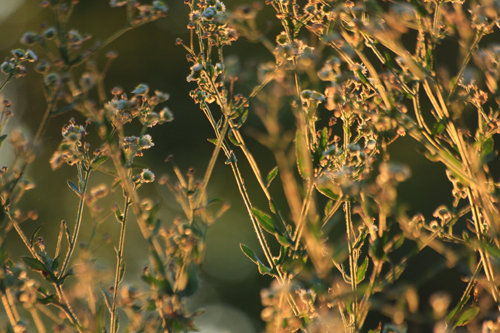
Glimpse into a field of asters.
(*photo credit)
October 23, 2013 WE Are Poor Socially Addicted People
The solemn words of the prophet Nathan to the sinful and blinded back-sliding King David is that "You are the one" (II Samuel 12:7). The dramatic words were a lightning bolt. Many of us have had moments of self-revelation when someone points out our imperfections. At times of waywardness, communities also hear words of accusation, and prophets such as Pope Francis indicate that modern consumer practices lead to wastefulness and self-indulgence. Our wealthy and culturally-advanced people find it difficult to acknowledge that we face a moment of truth as did David -- but now on a national and global level.
a) WE must be prophetic in the manner in which we act. We are called to be "priest, prophet, and king" through our Holy Anointing at Baptism and Confirmation. The role of the prophetic is the hardest to fulfill even though the others are hard enough. The prophetic bears special risks. The prophet is disowned and in deep trouble, for others do not want to hear the message and even seek to belittle the words of the speaker. Working together and seeing our limitations we begin to sense that the prophetic are weak.
b) Social addiction infests a consumer-oriented culture. It is the insatiable demand for more and more material goods that infests us all as consumers. In a democratic society that allows the wealthy to get away with excessive consumption, social addiction intermingles with individual addictions, for a society tolerates an addiction of the culture. Perversity results because
resources meant for essential needs of the billion extremely poor are diverted for the luxuries of a privileged few. In a society of such swelling middle class this becomes a major problem and exacerbates the environmental and social crisis. Efforts to curb damage are hindered by the growing acute problem of not wanting to put restrictions on the affluent who have such power and influence.
c) This message for all of us. Mother Teresa spoke about how the West is spiritually poor, but those inclined materially are slow to see it. Unfortunately, hundreds of millions strive for material improvement to levels beyond capacity. In this striving rests a tolerance for an existing massive and unaddressed disparity of wealth. Materialism is blinding to all of us either in what we use or in what we fail to address as a permissive culture.
d) Addicts are the poor. Addicts suffer but do not always recognize their condition -- a grace of sight. Here our road to Calvary confronts us all. We are party to the social addiction either by commission or omission. When seen, this becomes all the more burdensome, for now we bear a global cross of suffering on our collective backs. WE sense our inadequacy to come quickly to address the situation, for even in solidarity with others we are limited. Note: The Third Week of the Spiritual Exercises.
Prayer: Lord, help us enter fully into the sufferings of the Lord in this effort to save our wounded Earth.

"Jewels" on an autumn web.
(*photo credit)
October 24, 2013 ANOTHER Empowers Us to Act
We are immersed in a consumer culture and suffer from the addiction. Continuing in this insatiable journey from one material product to another is not a viable option -- for Earth will be destroyed. This moment of grace is to see our powerless condition and to look beyond. In this moment of grace we call on a Higher Power, for our rationality is not sufficient, nor are there hidden human gimmicks to bring about success. Paralysis is no option either for social addiction is globalized -- and solidarity immersed in addiction is a fiction; we must break out.
a) A resurrection-centered spirituality opens before us. Believers' last recourse is to turn in prayer to the Almighty, to Lord and companion in love and mercy. We call for help and yet underneath it all the graced call itself is the first glimmer of a new dawn. Believers reach beyond the allurement of affluence and turn to a Higher Power for assistance. Only in trust in Another will renewal occur. For the Christian community, God is our recourse and Christ is our companion.
b) God invites us to a moment of Grace. A willing response on our part is that moment needed to overcome the forces of evil that enslave this world in a materialistic consumer economy. Human efforts alone are not sufficient in themselves -- and this we acknowledge as believers. Fidelity is not sitting back and expecting God as rich daddy to clean up the human mess after us. We must enter the fray by making an effort, but only in discovering and acknowledging our powerlessness are we able to rediscover within ourselves the foundation of an empowerment to effect change.
c) Believers act through trust. The degree of our authentic cooperative efforts depends on our nearness to the Author of all empowerment. For Christians, this proximity is ever increased by our nearness to Christ himself in the Eucharist, the nourishment that allows us to carry on. Our role is to be healers, for in God we trust. Our inability to act alone without God only defines our inherent poverty and dependence. However, our willingness to act through a divinely given power is the center of our empowerment, one that we never lose sight of, as ex-addicts readily testify.
d) Believers' trust radiates out to a world. We speak for those who in their recognized poverty are unable to articulate this trust in God. We take on the sufferings of the Lord through our collective efforts. We initiate the resurrection renewal needed in our wounded Earth. In a spirit of kindness that we extend to others, we seek ways to reapportion resources in such a manner that all benefit through human love and charity. Note: The Fourth Week of the Spiritual Exercises.
Prayer for Divine Love: Lord, take up the gifts that you have given to us in this moment of sacrificial love. Give us only your love and your grace for that is sufficient for us to heal this wounded Earth and its afflicted people.

The Mourning Dove (Zenaida macroura).
(*photo by Sally Ramsdell)
October 25, 2013 A 21st Century Christian Revolutionary Manifesto
* Our beautiful and fragile Earth is wounded HERE before our eyes. Splendid Earth, product of billions of years of evolution, is endangered in this last moment of geological time by actions of the greedy and privileged few who are permitted to indulge their extravagances by the reckless silent and complacent. Resource depletion, waste, and pollution cries to heaven to be exposed and halted by all legitimate means, even to the point of civil disobedience. Through a down-to-Earth approach, we stewards of all creation must see clearly and do more than observe. At this most basic level; we accept our own faults of commission and omission, and we resolve to change our practices, while not denying being misled by merchants of doubt bent on material profits.
* Change is urgently necessary NOW. Time is of the essence, for the window of opportunity for meaningful actions to save our wounded Earth shortens by the day. Catastrophic events loom caused by continued increased greenhouse gas emission; they are just beyond the horizon. Individuals and small groups face the reality that small efforts are limited in this global crisis. Appropriate technologies are good but need further refinement and that takes precious time. An unchallenged consumer economy is a root cause of the crisis and must be confronted forthrightly even at the risk of our being called unpatriotic; a worldly culture calls the affluent to spend and not to share with those of essential needs. We reflect on Jesus' words and actions; his earthly ministry teaches us to share, to touch hearts with love, and to feed the hungry.
* WE are called to act in solidarity. In this level of eco-awareness we cannot waste time expecting the affluent to surrender privileges. The good news is that the poor can act through pooling resources, for we have God's option before us. As true revolutionaries we listen to Mary and join in raising the lowly and bringing down those in high places (Luke 1:52). The good news is that the poor hold the key to change; the harsh news is that we suffer from social addiction to consumer products and so we all are the poor. In a moment of grace we see that we suffer with Jesus on Calvary. Our physically poor brothers and sisters keep all focused and reminded of the temptation to escape to side issues. In a moment of grace we acknowledge our condition and turn to God.
* ANOTHER is at the heart of eco-empowerment. A change directed for and by the poor minimizes elitism and material profit motivation of individuals, and finds success in the rise of us all together as one Body. We are not privileged to be above others in intellect, wealth, or fame, but called to be together as poor folks who work cooperatively to fill what is wanting in the sufferings of Christ for his body the Church (Col. 1:24). Realizing our impoverishment opens us to God's power to help us to renewal (Rom. 1:4). Our deeds are directed to both saving a damaged environment and to furnish essentials of life to the poor. The ultimate end of our collective salvation is Christ (Eph. 1:12).
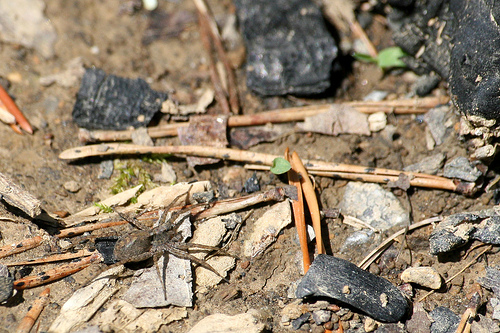
The wolf spider.
(*photo credit)
October 26, 2013 An Eco-Conservative Stage of Life
My views are fashioned in part on the decades of my life:
1. Life of a Christian is to be directed to knowing, loving and serving God and to love our neighbor as ourselves. This is destined to be a life's effort. -- Baltimore Catechism.
2. We build our service on what we are and our traditions, and that includes a rural background. This background made for me an impression that cannot be taken away and early work on the farm imprints itself throughout life. -- "Upturned Plow" (Daily Reflections, 8/31/11)
3. God's beauty shines around us if we but look and see. Conservative thinking requires constant attempts at prayer and seeing God in all things. Faith is seeing the brilliant countenance of Christ looking up at us from every creature. -- Ordination Card, June 1967
4. The First Earth Day is a refined call to discover the examples of massive pollution of air, water, and land. A first level of eco-humility is awareness that we consume too much and waste more than we are willing to admit.
5. The mountains call and addressing the poor is more than seeing damage: it involves correcting it. However, it soon becomes evident that reclamation is a gray area of imperfect human activity; a second level of humility. Being with the poor means that the poor brings about the healing process and not count on outsiders. The Lowly will rise and those in high places come down (Luke 1:54). In 1981, Reagan's transition team dismissed me after one sentence in a Science for Citizens Program presentation.
6. We cannot expect a resurrection-centered spirituality to be quickly accepted for it requires human conversion and rejection of elitism. We are called to reclaim our hearts. In listening, we hear Jesus' lamentation: "Look what they have done to my Earth." On touching Calvary's rock. -- A Holy Land visit, April 1992.
7. A second level of eco-humility is to try to repair the damages done to Earth through appropriate technology practices. However, these prove to be equivocal; some of what we do has effects and some seems to take unnecessary time, energy, and resources. Healing is an imperfect and longtime proposition, a work in progress. -- After 25 years of service at ASPI in 2002.
8. Earth is in far worse shape than anticipated and the vision of an impending catastrophe arises beyond my lifetime. This is exacerbated by the Capitalist consumer economy that is the prime cause of the Crisis. We are impoverished by commission, silence and omission, and fail to face our collective or social addictions. -- Daily reflections 2004 to present.
Prayer: Lord, our time is short; only in you do we trust.
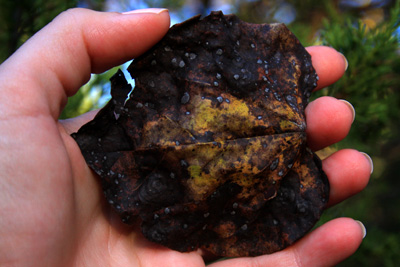
Redbud leaf, Cercis canadensis.
(*photo credit)
October 27, 2013 Our Prayerful Position Before God
The prayer of the lowly pierces the clouds;
it does not rest till it reaches its goal. (Sirach 35:17)
We have to constantly review our position before our merciful and loving God. This takes prayer on the part of all of us. Infrequently I have to answer the request of a hungry person at our parish and get them several sacks of food; I ask them to say a prayer for me. Most are astounded that I beg something from the one who begs from me -- and I often doubt whether anyone had ever asked them for prayers before. Shouldn't we listen to Scripture and discover that the prayer of a hungry person goes straight to the heavenly court.
Do I stand before God as a Pharisee or as a Publican? This is a day to consider our stance if we call it that. Jesus tells us that the bragging of the Pharisee did not bring justification. Do my prayers have a touch of righteousness, that is, with knowing I am praying and wondering about those who are forgetful about such spiritual duties and are busy with secular pursuits? We acknowledge that the poor are heard in their stance, but do we discover our own poor stance before the Almighty?
Do we seek to come as "poor" before the Lord in solidarity with those who are lacking essential means of life? If our culture is addicted to material things it is either because we truly are, or we do not have the courage to challenge those who are; either way we are impoverished. This lack of courage is a spiritual absence, a poverty of spirit of which Mother Teresa spoke when in America. We are all poor folks but some of us do not recognize it. The harsh answer is to become destitute for others, but that is a helpless state and not what the Lord wants of us.
Knowing our true naked condition allows us to distance ourselves from the Pharisee, for he did not know his own inherent spiritual poverty; in a sense of righteousness he showed himself off before God, which is an utter lack of authentic spirituality -- for God looks into the heart. However, do we really stand together with the publican, for that is an uncomfortable position -- asking God's forgiveness for wrongs done?
Reformation Sunday is more than a Protestant event; all Christians must consider the duty of constant reform in our lives. Just as individuals must review their prayerful position, so do societies, church groups, and nations, for we have social stances as well as individual ones. The review is the actual ongoing reform that is emphasized at this special time. Perhaps no parable tells us of that need more than today's, so that humbled we can prepare for the coming of the Lord. Through renewal we can experience our poverty of spirit, our posture before God.
Prayer: Lord, teach us to be humble, for if we look deeply we will find many reasons for doing so.
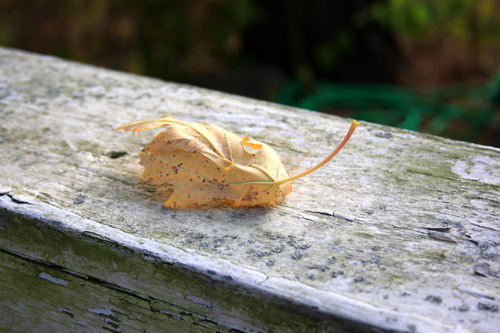
Finding beauty in simplicity.
(*photo credit)
October 28, 2013 A Church as Promoting Prayerfulness
May they all be one. Father, may they be one in us.
(John 17:21)
On the Feast of Sts. Simon & Jude let's consider Church in its global ministry. The conclusion of Chapter Seven in Reclaiming the Commons treats Church as instrument of change in a world of gross materialism. One ecological matter requires compromise involving silence and noise-making activity, for neither have complete control over time or space. Each must have its time and space. Only then can an atmosphere exist for healthy travel on the road to holiness.
------------------------
The Church is committed to the lifetime quest for holiness. This can be achieved by affording sacred times and sacred places for music and formal public worship; likewise, sacred time and space is to be encouraged for sacred silence and prayer.
Action 1 -- Promote quiet time and space.
The Church enhances a prayerful spirit by providing and maintaining chapels, shrines, and meditation gardens of sacred space where people are invited to come and pray. Retreat centers should be areas where people can come and find God, apart from the hustle and bustle of everyday life. During periods of public worship, the Church encourages moments of silent reflection for all to learn to contemplate the sacred Mysteries held dear. Private prayer is always fostered and those who have excelled in such devotions are honored as saints. Our ancestors included praying people who invite us to share in a community of eternal peace; we must do our best in this mortal life to prepare ourselves for that eternal community gathering.
Action 2 -- Sponsor public formal prayer events.
The heart of religious growth comes through gathering of members on a periodic basis to praise God in prayer, exhortation, song, and other exercises. The Liturgy, the work of the people, is such a sacred time. Where possible, the Church builds and maintains centers of sacred space for such worship, and embellishes these places with art works of all kinds and with permanent and floral decorations and other embellishments reflecting the culture and devotional needs of worshippers. Music, dance, and dramatic arts are part of formal worship, as are public processions, devotions, and pilgrimages.
--------------------
The public nature of Church as instrument of service for others to see and engage is part of Christ being with us to the end of time. The Lord is here and present, and we must take the rather difficult task of giving sound and silence its proper place as part of our work as members of the Body of Christ.
Prayer: Lord, give us the strength it takes to know when to speak and be silent, and when to get others to do the same.

Overlook along the Natchez Trace, near Tishomingo, MS.
(*photo credit)
October 29, 2013 Encouraging Outdoor Play in October
Children need to get outdoors more often; as this is the time for Halloween "trick or treat," at least we can break them away from video games to traverse the neighborhood for one brief evening. Encouraging exercise is more and more a challenge, not only for youth but for adults with the specter of an epidemic of obesity hanging over all. Everyone needs to spend some time outdoors and to learn to enjoy ourselves now in autumn and in all seasons of the year. In fact, outdoor play can be intergenerational, only the specific type may differ according to age. Let's consider this in the light of the recently released book with Warren and Pat Brunner: Appalachian Sensations: A Journey through the Seasons.
----------------------
October -- Piled Leaves for Romping
The locusts, these have no king,
and yet they all march in good order.
(Proverbs 30:27)
Is the wild kingdom so chaotic and disordered? If we would
but cease to wander about, we might discover a certain order and
method to microcosmic life beneath our feet. We see swarming
insects such as yellow jackets, ever so busy just before frost. They have a mission to transmit life to another generation -- and little time left to do it. The hustle and bustle of these creatures is for an internal and maybe greater purpose.
What applies to the insect world extends to our human portion
of Earth's total kingdom. Youth seem to enjoy a certain chaotic bit of fun, but that is part of becoming bonded with others and releasing some of that boundless energy that they possess. They too must hurry, for the span of youth is short. If their activities did not demand so much energy, most adults would follow them and romp in the leaves with them.
We expend our energy by raking and collecting leaves, and think for a moment that this is the total purpose of our lives. But the deliberate playful nature of youth around us stimulates us to celebrate in our own ways. The autumn-colored falling leaves make us hasten to get in a little more outdoor fun before the weather turns colder and outdoor activity slackens. Let's resolve to stay active at all times.
-----------------------
Prayer: Lord, teach us to enjoy the outdoors with the magnificence of creation all about. Help us to see the need for fresh air and full spectrum sunlight and to enjoy all creation.
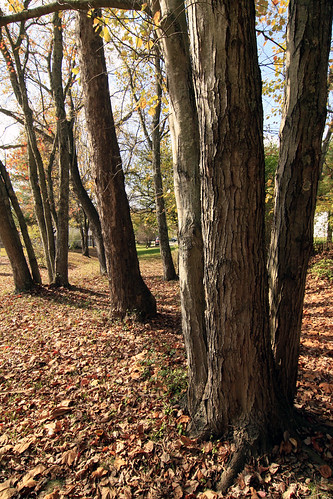
A small grove of Autumn colors.
(*photo credit)
October 30, 2013 Forty-Four Titles for Trees
In the month of October when leaves are changing color and in the midst of Cleaner Air Week, it is the perfect time to talk about our natural focus of this month, God's gift of trees by many names:
Air cleansers
Providers of fruit and nuts
Blessing of God's Hand
Autumn's paintbrushes
World's majestic beauties
Enhancers of property values
Carbon sink of the planet
Nature's air conditioners
Faithful forest members
Moisture absorbers
Teachers of human mortality
Green outdoor air conditioners
Habitats for varmints
Lungs of the Earth
Sources of building materials
Controllers of Erosion
Playgrounds of the adventuresome
Parents of fossil fuels
Clothing of the hills
Tamer of floods
Healer of the damaged land
Breakers of winter's breezes
Winter insulators
Nesting places for wildlife
Silencers from noisy disturbances
Naturalists' delight
Escapes for the frightened
Rests for migrating birds
Shade coolers for the overheated
Signposts for travelers
Nature's lightning rods
Restorers of aquifers
Gentle community organizers
Calmers of residents
Utility workers nightmare
Recorders of wet and dry years
Seasonal markers
Wildlife sanctuaries
Tourists destination
Inspiration for poets and musicians
Greeters of travelers from deserts
Mood changers for residents
Reducers of mental fatigue
Proofs of God's creative hand
But only God can make a tree -- Joyce Kilmer
Prayer: Lord, help us learn to pray amid the trees, to sense their worth, and to celebrate with others their multiple and wonderful characteristics.
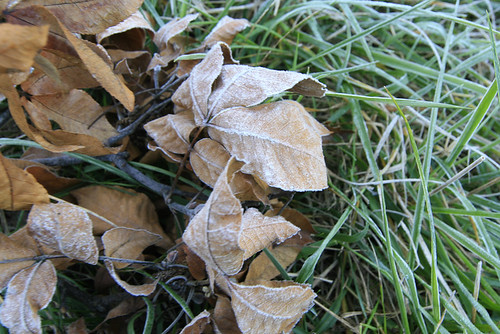
Kentucky first frost, October.
(*photo credit)
October 31, 2013 Sainthood: Loving through Deeds
We prepare for All Saints Day tomorrow. On this Halloween or "holy evening" we recall those who are the forgotten but holy ones. They are the overlooked saints that we celebrate tomorrow. What does it take to be a saint? Granted, some receive public recognition due to lives well spent or martyrdom. It is certainly not money that makes them popular for many were or became poor. It is not even fame at the time, for few locals recognized Roman martyrs or even Joan of Arc. Still whatever it is, a few for a brief time regard the person as beloved and worthy of being called near to God and having a certain sanctity. These are the saints no one remembers today, for their loving champions were few and have passed on and are buried in unknown graves. "Known but to God" and with that knowing rests an essential element of sainthood.
Fidelity is often regarded as a starter for holiness, and so it is. However, those who came to the harvest at the last moment (like Dismas on the cross) became saints in a short time even though much of life had been wasted in wrongdoing. Hope is an essential ingredient as well, and certainly is central right before death, but some did not have extraordinary hope until the very end. But we look a little farther and find that all saints have a quality of love, that virtue carried beyond the grave, when we can no longer speak but only have love for our eternal journey.
Not all people have the gift to phrase words of love or craft a flowing statement worth noting. Some noted saints were tongue-tied when it came to such outward expressions. However, they learned to express their love through deeds done for others, and this was imprinted on their hearts. Mere words have a place, for we must voice in some way the fact that we love God with our whole heart and soul, mind and strength -- and our neighbor as ourselves. Often loving deeds gets hidden in the messiness of life and especially in those final moments. Then to mouth words of extraordinary love is forced, and we are left feeling totally inadequate -- and at that moment of utter humility we make our ultimate and most saintly sacrifice of passing on.
If love is not measured in word, then there must be more. Popular saints are people of action, in lowly deeds of any size, even when they lacked skills to move mighty works. The greater the love, the greater the deed in God's eyes. Such people combine their fidelity to God and to neighbor with a hope that amid it all, new and better things will happen. Thus, those with living faith and hope have the energy it takes to carry on with a loving heart which is at the core of sanctity. A loving deed contains faith and hope within, even though in an everlasting time both will give way to an eternal love, a sharing in the divine family. Tomorrow's saints perform loving and often unrecognized deeds.
Prayer: Lord, give me the grace to see loving deeds as some degree of holiness. Help us make each one a little closer to the holiness to which we strive to grow. |

